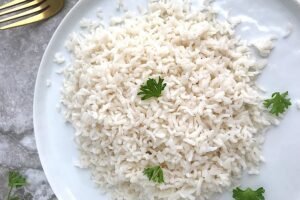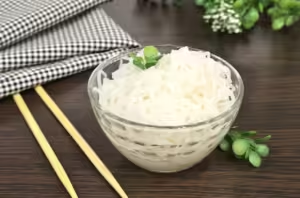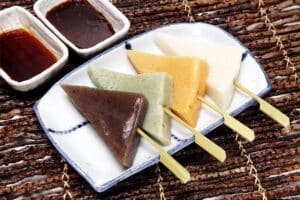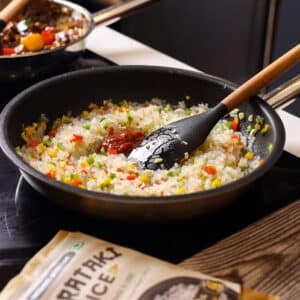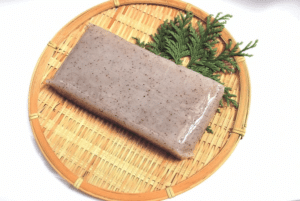
Is Konjac Rice Keto-Friendly?
- Andrew Yang
- 18 8 月, 2023
- 11:26 上午

Table of Contents
When it comes to the ever-popular keto diet, every food choice matters. Among the recent trending options is Konjac rice, a low-carb and gluten-free alternative that has piqued the interest of health-conscious individuals. In this article, we dive into the world of Konjac rice and explore whether it aligns with the keto lifestyle.
Table of Contents
- Introduction
- Understanding the Keto Diet
- Exploring Konjac Rice
- Konjac Rice: What is it?
- Origins and Composition
- Carb Content and Fiber
- The Keto Diet: A Low-Carb Approach
- Key Principles of Keto
- Importance of Carbohydrate Control
- Konjac Rice and Ketosis
- Impact on Ketosis
- Glycemic Index and Ketogenic Compatibility
- Benefits Beyond Carbs
- Fiber and Gut Health
- Calorie Count and Satiety
- Konjac Rice in Keto Recipes
- Creative Culinary Applications
- Enhancing Ketogenic Meals
- Considerations and Precautions
- Digestive Tolerance
- Balancing Nutritional Needs
- Comparing to Traditional Rice
- Nutritional Contrast
- Keto-Friendly Swaps
- User Experiences
- Insights from Keto Practitioners
- Real-Life Perspectives
- Expert Opinions
- Nutritionist Insights
- Informed Keto Advice
- Is Konjac Rice Keto-Friendly?
- Summing Up the Evidence
- Making Informed Choices
- FAQs (Frequently Asked Questions)
Introduction
Firstly, in the realm of diets, the keto diet has gained immense popularity for its unique approach to weight loss and health improvement. At the heart of this diet lies the need to drastically reduce carbohydrate intake while embracing high-fat and moderate-protein consumption. With Konjac rice making its way into the health scene, the question arises: Is Konjac rice a suitable option for those adhering to the keto lifestyle?
Understanding the Keto Diet
The keto diet, short for ketogenic diet, is characterized by its emphasis on inducing a state of ketosis in the body. Ketosis occurs when the body switches from using carbohydrates as its primary energy source to burning fats for fuel. Thus, this metabolic shift is believed to facilitate weight loss and offer various health benefits.
Exploring Konjac Rice
Further, Konjac rice is a relatively new entrant in the world of low-carb and gluten-free alternatives. Derived from the root of the Konjac plant (Amorphophallus konjac), this rice substitute boasts minimal carbohydrates and calories. As health-conscious individuals seek alternatives to traditional grains, Konjac rice has emerged as an intriguing option.
Konjac Rice: What is it?
To determine if Konjac rice is keto-friendly, it’s crucial to understand its composition and nutritional profile.
Origins and Composition
Konjac rice hails from the Konjac plant, which is native to Eastern Asia. The plant’s root contains glucomannan, a water-soluble dietary fiber known for its ability to absorb water and form a gel-like substance. This unique characteristic lends Konjac rice its distinct texture.
Carb Content and Fiber
One of the primary attractions of Konjac rice is its remarkably low carbohydrate content. A typical serving contains negligible net carbs due to its high fiber content. Fiber is not fully digested by the body, thus contributing to a reduced impact on blood sugar levels.
The Keto Diet: A Low-Carb Approach
The foundation of the keto diet rests on minimizing carbohydrate intake to induce and maintain ketosis.
Key Principles of Keto
The central tenet of the keto diet involves drastically cutting down on carbohydrates, prompting the body to deplete its glycogen stores and switch to burning fats for energy. This metabolic state, known as ketosis, is characterized by the production of ketones from fats.
Importance of Carbohydrate Control
Maintaining ketosis hinges on limiting carbohydrate consumption. Consuming too many carbs can disrupt the delicate balance needed for the body to remain in ketosis. For this reason, keto enthusiasts meticulously monitor their carb intake.
Konjac Rice and Ketosis
The impact of Konjac rice on ketosis is a pivotal consideration for those following the keto diet.
Impact on Ketosis
Given its minimal carbohydrate content, Konjac rice is often regarded as a keto-friendly alternative. The absence of significant carbs means that consuming Konjac rice is less likely to disrupt ketosis, making it potentially suitable for keto practitioners.
Glycemic Index and Ketogenic Compatibility
The glycemic index (GI) measures how quickly a food item raises blood sugar levels. Konjac rice’s low GI further supports its keto compatibility, as it has a minimal impact on blood glucose levels, which is beneficial for maintaining ketosis.
Benefits Beyond Carbs
Konjac rice offers advantages beyond its low carbohydrate content, making it an appealing option for keto dieters.
Fiber and Gut Health
The high fiber content of Konjac rice is a boon for digestive health. Fiber supports regular bowel
movements and aids in promoting a healthy gut microbiome, which is crucial for overall well-being.
Calorie Count and Satiety
Beyond being low in carbs, Konjac rice is also low in calories. This can be advantageous for those aiming to manage their calorie intake while feeling satisfied after meals, a common goal among individuals on the keto diet.
Konjac Rice in Keto Recipes
The versatility of Konjac rice extends to its incorporation into a variety of keto-friendly recipes.
Creative Culinary Applications
From stir-fries to risottos, Konjac rice’s neutral flavor and unique texture make it adaptable to a wide range of dishes. Its ability to absorb flavors makes it a canvas for creative culinary exploration.
Enhancing Ketogenic Meals
Konjac rice can serve as a base for nutrient-rich and satiating meals. By combining it with healthy fats and protein sources, individuals can create well-rounded and keto-compliant dishes.
Considerations and Precautions
While Konjac rice offers several benefits, certain considerations should be kept in mind when incorporating it into a keto diet.
Digestive Tolerance
Konjac rice’s high fiber content can lead to digestive changes, especially if introduced suddenly. Gradual incorporation and adequate hydration can help mitigate potential digestive discomfort.
Balancing Nutritional Needs
While Konjac rice is low in carbs and calories, it’s essential to maintain a balanced diet that includes a variety of nutrient-rich foods to meet overall nutritional needs.
Comparing to Traditional Rice
To gauge Konjac rice’s keto-friendliness, it’s worthwhile to compare it to its traditional rice counterpart.
Nutritional Contrast
Konjac rice stands in stark contrast to traditional rice when it comes to nutritional composition. Its negligible carb content and minimal calories differentiate it significantly from carbohydrate-rich rice.
Keto-Friendly Swaps
For individuals on a keto diet, Konjac rice can serve as a convenient substitute for traditional rice in various dishes, allowing them to enjoy familiar flavors without straying from their dietary goals.
User Experiences
Real-life experiences from individuals following the keto diet provide insights into Konjac rice’s compatibility.
Insights from Keto Practitioners
Listening to the experiences of those who have integrated Konjac rice into their keto journey can shed light on its impact on ketosis, taste preferences, and overall satisfaction.
Real-Life Perspectives
Personal anecdotes offer a nuanced view of Konjac rice’s place in keto diets. These stories can help individuals make informed decisions about incorporating this alternative into their meals.
Expert Opinions
Nutritionist insights provide valuable guidance on Konjac rice’s suitability within the context of a keto diet.
Nutritionist Insights
Registered dietitians and nutrition experts offer professional opinions on Konjac rice’s compatibility with the keto diet. Their analysis considers factors such as nutritional value, impact on ketosis, and dietary balance.
Informed Keto Advice
Expert opinions offer a comprehensive view of whether Konjac rice aligns with the principles and goals of the keto diet, helping individuals make well-informed choices.
Is Konjac Rice Keto-Friendly?
With a comprehensive understanding of Konjac rice, it’s time to answer the central question: Is Konjac rice keto-friendly?
Summing Up the Evidence
The evidence points to Konjac rice being a keto-friendly option due to its negligible carb content and minimal impact on blood sugar levels. Its versatility and potential benefits align well with the principles of the keto diet.
Making Informed Choices
Ultimately, whether Konjac rice fits within an individual’s keto journey depends on personal preferences, dietary goals, and digestive tolerance. Considering the broader context of one’s diet is key to making well-rounded and sustainable dietary choices.
FAQs (Frequently Asked Questions)
- Can Konjac rice be consumed by those on a strict keto diet? Yes, Konjac rice is often considered suitable for individuals on a strict keto diet due to its low carbohydrate content and minimal impact on blood sugar levels.
- Is Konjac rice safe for individuals with digestive sensitivities? While Konjac rice’s high fiber content can be beneficial for digestion, individuals with sensitivities should gradually introduce it to their diet and ensure proper hydration.
- How does Konjac rice compare to cauliflower rice in terms of keto compatibility? Both Konjac rice and cauliflower rice are low-carb alternatives. While both can be keto-friendly, personal preferences and nutritional goals may influence the choice.
- Is Konjac rice a complete substitute for traditional rice in keto recipes? Konjac rice can be a convenient substitute in keto recipes that call for rice. However, it’s essential to consider texture and taste differences when making the switch.
- Can Konjac rice enhance the feeling of fullness during a keto diet? Yes, Konjac rice’s high fiber content can contribute to a feeling of fullness, which is beneficial for individuals aiming to manage their calorie intake on a keto diet.
🍚 Read Next: Konjac Gum As The Secret Ingredient for B2B Success 🍚


